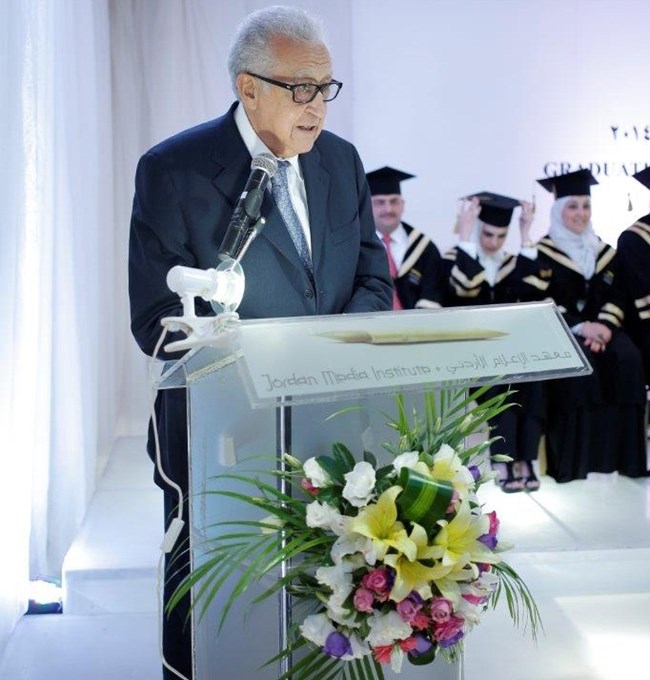Image:

21 Oct 2014
<br />
The UN envoy and former Foreign Minister of Algeria Lakhdar Brahimi said on Thursday, 18 October 2014 that “journalists should take care not to allow themselves to be used in distorting the truth” stressing on societies’ need to enjoy free, responsible press that neither engages in misleading the public, nor in distorting facts.<br />
<br />
In a speech delivered during the graduation ceremony of the Jordan Media Institute’s fifth intake of MA graduates, Brahimi added that there is a lot in common between diplomacy and journalism, as both fields require a great effort in staying informed of ongoing issues. During the ceremony which was held under the patronage of Her Royal Highness Princess Rym Ali, Brahimi added that regardless of the extent of knowledge that journalists have in human affairs, this knowledge is never complete, and is ever changing. It requires a huge effort to keep up with, and no one can claim to monopolize it.<br />
<br />
Addressing the graduates, Brahimi noted: “As the fourth estate, journalism finds itself in a controversial relationship with authorities, especially with governments, with which it has a complicated relationship that is sometimes amicable and respectful, and other times tense and confrontational”. He also spoke of his long, diplomatic experience, and the importance of media in revealing the truth through reading between the lines, and not taking things at face value.<br />
<br />
Brahimi highlighted the importance of media due to its impact on the public, explaining how the media sometimes creates truths referring to an article published in the New York Times in 2003 about the existence of weapons of mass destruction in Iraq. Although the newspaper later on admitted that the article was false, the vast majority of Americans remained convinced of its content.<br />
<br />
Also speaking at the ceremony, JMI Dean, Dr. Basim Tweissi, said that the institute’s curriculum was developed on the basis of freedom of expression, respect for reason and the right to express different points of view. Tweissi also highlighted JMI’s strategy for the next four years including the launch of a thesis track for the institute’s MA program in Journalism and New Media which kicked off last month. The dean listed other plans and projects the institute is currently working on such as establishing a Media Research and Surveys Unit in addition to offering a training diploma in Digital Media. “After concluding national and international partnerships, many of our initiatives are now in the implementation phase, such as the Jordanian Media Credibility project ‘Akeed,’” the dean said.<br />
<br />
In his speech, Valedictorian Mohammad Dweirj described his post-graduate studies as being “not only about a certificate, but about maturity; not just an academic journey, but real engagement with the public; not merely about using technology, but actually making use of it”.<br />
<br />
During the graduates’ one year studies at JMI, they were introduced to new media tools. They enhanced their writing skills, and developed their reporting techniques in addition to carrying out intensive field work. These skills were gained in an atmosphere that simulates a professional working environment, and administered by a highly competent team of academics and experts from Jordan, and the region. During the academic year, JMI also gave the students the opportunity of meeting various notable politicians and journalists in addition to participating in cultural visits to Norway, Sweden and the AUB.<br />
<br />
<br />
At the end of the ceremony Princess Rym Ali, JMI Founder, along with Professor Ekhleif Tarawneh, President of the University of Jordan, and Dr. Basim Tweissi handed the certificates to the students. The certificate is awarded in collaboration with the University of Jordan in the context of an academic partnership agreement linking the two institutions.<br />



